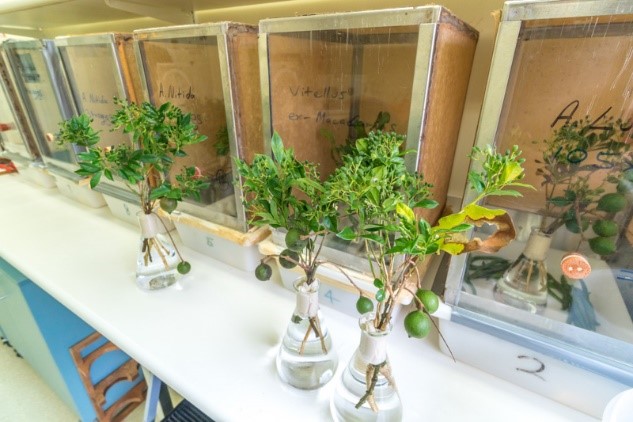Our research

Agriculture and horticulture
The WPII horticulture team supports profitable and sustainable horticulture and agriculture through research, compliance, education and industry engagement. It is well placed to assist northern NSW horticultural industries with staff specialising in entomology, crop physiology and industry development. The team support NSW producers of macadamia, blueberries and banana in a variety of research initiatives including:
- Developing integrated pest management (IPM) programs, including monitoring strategies, cultural and biological control and screening of insecticide compatibility
- Bananas: investigating improved pest and disease resistance and cold tolerant varieties as part of a nationally coordinated program
- Macadamias: integrated pest and disease research, soils and nutrition, biosecurity and physiology
- Berries: a high-tech blueberry research facility enables scientifically tested growing formulations and recommendations regarding the timing and amount of fertiliser application to match crop demand
Pasture and cropping work is also conducted at WPII to support the agriculture industry through variety trials and evaluations, and partners with agencies such as Local Land Services to provide support for local agricultural initiatives.
Soil and water research
The Soil and Water Research Unit at Wollongbar works with industries including cropping, horticulture, cotton, and sugarcane. Specialised research facilities are used for the assessment of soil health with advanced bioinformatics and data analysis, analysis and risk assessment of pesticides and nutrients in the environment (including movement, toxicity, aerial deposition), the development of biochar technologies and next-generation soil technologies (eg. carbon-coated fertilisers), soil carbon sequestration technologies, mitigating soil greenhouse gas emissions and field trial research. Strategic plan outcomes addressed include carbon neutrality and climate resilience; economic growth and sustainable resources and productive landscapes.
Aboriginal fishing and marine environments
Statewide responsibilities for leading, managing and coordinating marine and coastal aquatic habitat management and Aboriginal cultural fishing including the development and implementation of legislation, policies and plans to provide for Aboriginal cultural fishing, to conserve aquatic resources and habitats in coastal catchments and deliver benefits of a healthy marine estate for the NSW community. Leading the marine estate reform program for DPI including delivery of the Marine Estate Management Strategy and the management of NSW marine parks and aquatic reserves, including engagement and cooperation with stakeholders and community groups.
Plantations Regulation Unit
Plantation Officers authorise timber plantations on private and public land, giving harvest guarantees; carry out audits to ensure plantations comply with regulations; maintain a state-wide database of plantations and provide information and support to the industry. Our clients include small landholders through to the Forestry Corporation of NSW.
Agricultural Land Use Planning
The Agricultural Land Use Planning (ALUP) unit works to ensure that agricultural industries and the land and resources on which agriculture depends are adequately considered in all aspects of the NSW planning system.
Positive outcomes for agriculture are sought through policy, agricultural planning advice and education with a key role in reducing the potential for land use conflict.